The book Surprised by Life by Patrick Madrid is a collection of stories from people who converted to Catholicism. One story, told by a man named Chris Aubert, describes how a post-abortive pro-choice man became a passionate pro-lifer.
After graduating law school, Aubert dated a string of women. His first encounter with abortion occurred when a young woman he had broken up with started calling him. The relationship had been casual, and he was ready to move on, so he ignored her phone calls. Then one evening, Aubert accidentally picked up the phone without screening the call, and spoke to her. She said she had something urgent to tell him, and, after she insisted, he reluctantly agreed to meet with her:
When I got there, this girl – who had not been a serious girlfriend – sat me on the couch and matter-of-factly blurted out, “Chris, I’m pregnant.” Before I could absorb the news, she added, “and I want to get an abortion.”
At that time for me, marriage was not in the cards, either with her or anyone else. Marriage would’ve blocked my path to money and power…. So I gladly agreed with her decision to abort, using the same excuses we hear today: “It’s just a blob of unviable tissue”; “It’s her body, and she can do with it what she pleases”; “I’m too young”; “I’m not ready to have children”; and the old standby, “This is America, and our Supreme Court says abortion is legal!”
The woman asked Aubert if he would go with her to the abortion facility. Aubert declined. He felt it was her problem, not his. All he did was write a check for the cost of the abortion. Rather then give his ex-girlfriend the check face to face, he dropped it off when he knew she would not be home.
READ: The abortion industry lies to women. That’s why we need ultrasound laws.
Aubert never spoke to the woman again, and he didn’t think much about the abortion. Sometime later, he found himself dating another woman. In this case, the relationship was more serious. She too got pregnant, and decided to get an abortion. This time, though, he went with her to the facility. Afterwards, he took her to lunch. But he felt uneasy:
At lunch, we didn’t talk much about what we just done. Mainly, I remember the silence. Although I had freely and even eagerly agreed to the second abortion, something about it felt wrong, but I didn’t know what. I also began thinking again about the first abortion. Nonetheless, apart from an occasional awkward feeling, they had no lasting effect on me.
The relationship did not last. Aubert explains that he had no reason to think abortion was wrong. He had never really been exposed to pro-life information, and what he saw portrayed in the media never made him question abortion. He said, “Everywhere I turned, abortion was portrayed as the enlightened position in tough situations faced by women who just wanted autonomy over their bodies.”
Eventually, Aubert met and married his wife, and she became pregnant. When they went for an ultrasound, Aubert’s whole life changed:
When [the wife] was about eight weeks pregnant, I saw for the first time in my life in the ultrasound waiting room a fetal development chart and was stunned by what it showed.
Before I could process this information, we were called into the ultrasound room. On the screen was that supposedly unviable tissue mass moving around, right before my eyes. I couldn’t believe it, and I pointed at the screen excitedly and said out loud, “I want to meet the person who says that’s not a baby, because there is no doubt that’s a baby!”…
Instantly, I understood the evil of abortion and was flooded with shame and sorrow for having been instrumental in the deaths of two of my own little babies.
Literally only minutes earlier I had been pro-choice; now I was pro-life.
Aubert’s eyes were finally opened to what abortion really was. He went on to mourn the two abortions he had been partially responsible for. Now he is a dedicated pro-lifer.
His story illustrates the power of ultrasound to change hearts and minds. It also shows that pro-lifers must educate people about fetal development and abortion procedures. Had Aubert known the facts beforehand, he may have been able to give his girlfriends the support they needed to carry to term. While the ultimate decision rested with the women, had Aubert supported them, the outcomes might have been different. Sadly, Aubert learned the hard way about the reality of abortion.
Source: Patrick Madrid Surprised by Life (Manchester, New Hampshire: Sophia Institute Press, 2017)
104-105, 107







